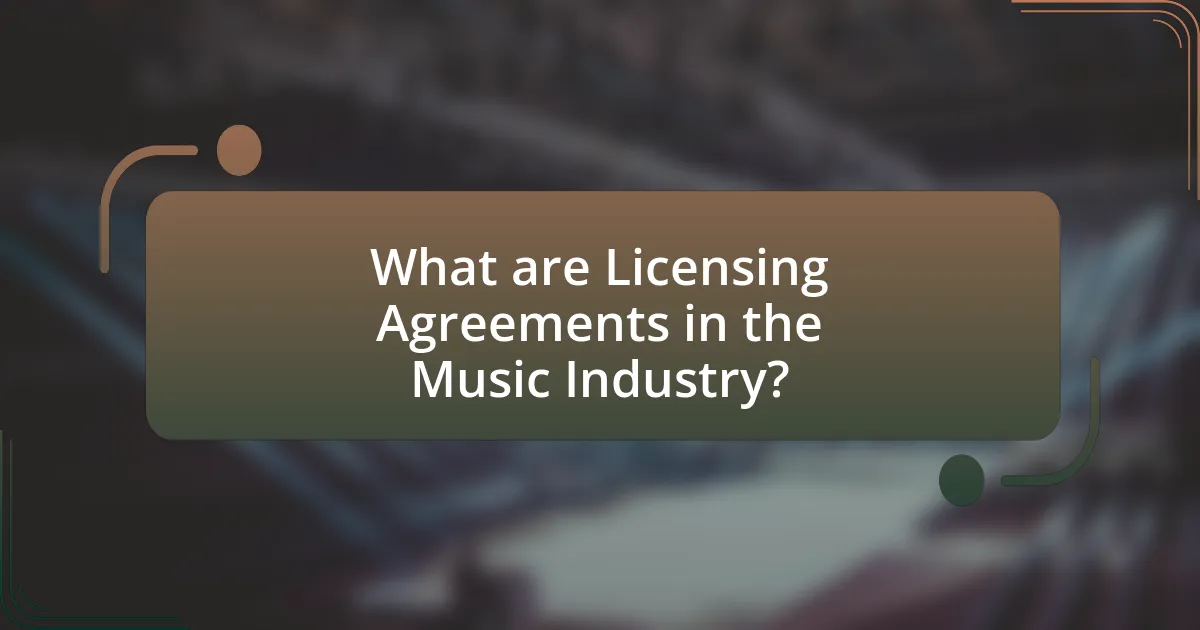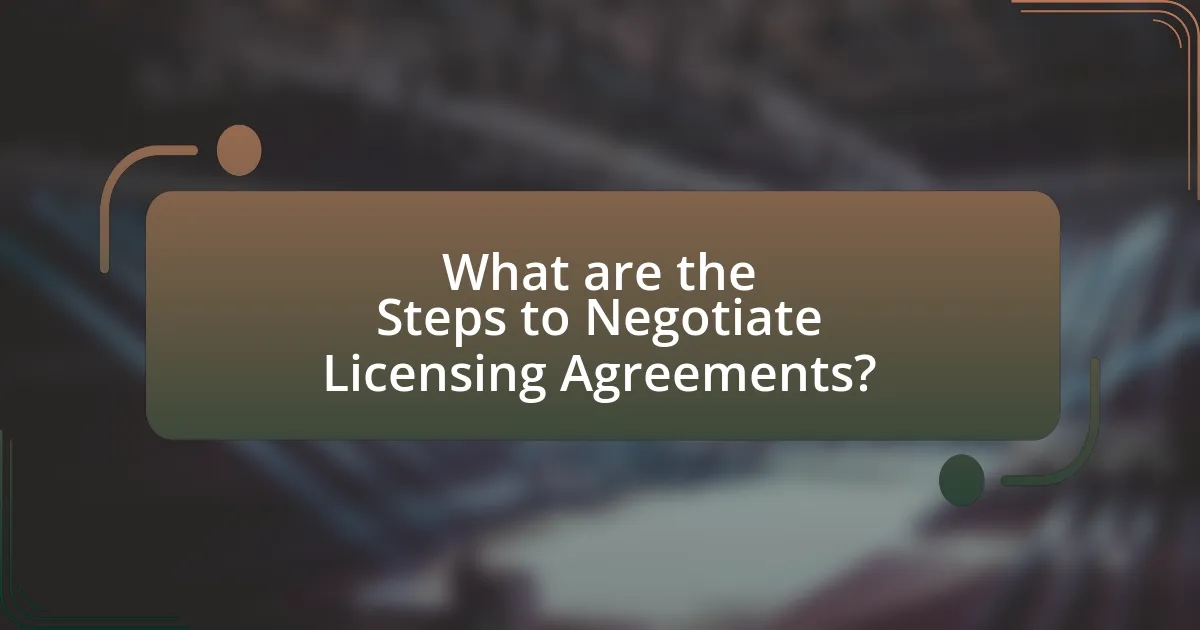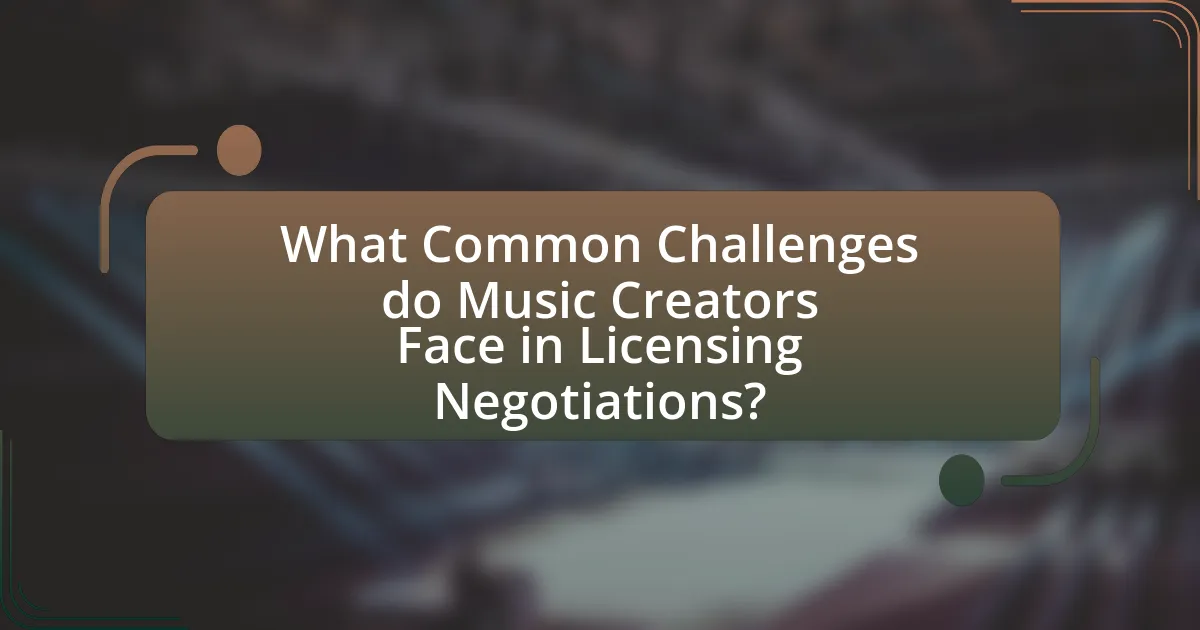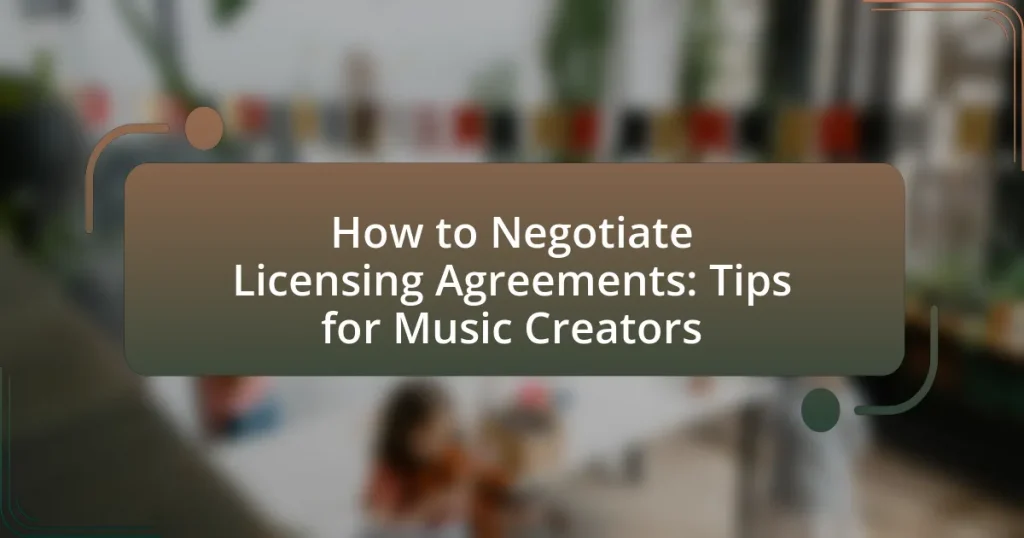Licensing agreements are essential legal contracts in the music industry that allow one party to use music owned by another under specified conditions, ensuring creators receive compensation and protecting their intellectual property rights. This article outlines the function of licensing agreements for music creators, key elements involved, and the various types that exist, emphasizing their importance in generating revenue and maintaining control over artistic work. It also provides practical guidance on negotiating these agreements, including preparation strategies, common challenges faced, and best practices for achieving favorable terms, ultimately equipping music creators with the knowledge needed to navigate the complexities of licensing negotiations effectively.

What are Licensing Agreements in the Music Industry?
Licensing agreements in the music industry are legal contracts that grant permission for one party to use a piece of music owned by another party under specified conditions. These agreements typically outline the rights granted, the duration of use, and any financial compensation involved, such as royalties or flat fees. For instance, a licensing agreement may allow a film producer to use a song in a movie, ensuring that the songwriter receives payment for that use. Such agreements are essential for protecting intellectual property rights while enabling creators to monetize their work effectively.
How do Licensing Agreements function for Music Creators?
Licensing agreements function for music creators by granting permission to use their music under specific terms and conditions. These agreements outline the rights and limitations regarding how the music can be used, including duration, territory, and compensation. For instance, a licensing agreement may allow a film producer to use a song in a movie for a set period, ensuring the creator receives royalties based on the usage. This structured approach protects the creator’s intellectual property while enabling them to monetize their work effectively.
What are the key elements of a Licensing Agreement?
The key elements of a Licensing Agreement include the parties involved, the scope of the license, payment terms, duration of the agreement, and termination conditions. The parties involved are typically the licensor, who owns the rights, and the licensee, who seeks to use those rights. The scope defines what rights are granted, such as reproduction, distribution, or performance. Payment terms specify the financial arrangements, including royalties or flat fees. Duration outlines how long the license is valid, while termination conditions detail how either party can end the agreement. These elements ensure clarity and protect the interests of both parties in the licensing process.
How do different types of Licensing Agreements vary?
Different types of licensing agreements vary primarily in their scope, duration, and the rights they grant to the licensee. For instance, exclusive licensing agreements provide the licensee with sole rights to use the intellectual property, while non-exclusive agreements allow multiple licensees to use the same property. Additionally, some agreements may be limited to specific territories or markets, while others can be global. The duration of these agreements can also differ, with some being short-term for specific projects and others being long-term for ongoing use. These variations are crucial for music creators to understand, as they directly impact revenue potential and control over their work.
Why are Licensing Agreements important for Music Creators?
Licensing agreements are crucial for music creators because they legally protect their intellectual property and ensure they receive compensation for the use of their work. These agreements define the terms under which music can be used, including rights to reproduce, distribute, and perform the music. By establishing clear terms, licensing agreements help prevent unauthorized use and infringement, which can lead to financial losses for creators. According to the U.S. Copyright Office, music creators can earn significant revenue through licensing, with the global music licensing market valued at over $1 billion in 2020. This financial incentive underscores the importance of licensing agreements in safeguarding the interests of music creators.
What benefits do Licensing Agreements provide to artists?
Licensing agreements provide artists with multiple benefits, including financial compensation, exposure, and control over their work. Financially, artists receive royalties or upfront payments for the use of their music, which can significantly enhance their income. Exposure is another key benefit, as licensing allows artists to reach wider audiences through various media platforms, such as films, commercials, and video games. This increased visibility can lead to more opportunities, such as live performances or collaborations. Additionally, licensing agreements often grant artists a degree of control over how their work is used, allowing them to maintain their artistic integrity and brand identity. These benefits collectively contribute to an artist’s career growth and sustainability in the competitive music industry.
How can Licensing Agreements impact a creator’s revenue?
Licensing agreements can significantly enhance a creator’s revenue by providing a structured way to monetize their intellectual property. These agreements allow creators to grant permission for others to use their work, such as music, in exchange for royalties or upfront payments. For instance, a study by the Music Industry Association found that artists who engage in licensing can earn up to 50% more than those who do not, as licensing opens additional revenue streams through media placements, advertisements, and merchandise. This financial boost is particularly evident in the music industry, where licensing tracks for commercials or films can lead to substantial earnings, thereby directly impacting a creator’s overall income.

What are the Steps to Negotiate Licensing Agreements?
The steps to negotiate licensing agreements include identifying the parties involved, defining the scope of the license, determining financial terms, drafting the agreement, and finalizing the contract. Initially, parties must establish who will be licensing the content and who will be receiving the license. Next, the scope of the license should be clearly defined, including the rights granted, duration, and territory. Financial terms, such as royalties or flat fees, must then be negotiated to ensure both parties are satisfied. After these elements are agreed upon, a formal draft of the agreement should be created, outlining all terms and conditions. Finally, both parties review and sign the contract to finalize the licensing agreement. These steps are essential for ensuring clarity and mutual understanding in the licensing process.
How can Music Creators prepare for negotiations?
Music creators can prepare for negotiations by conducting thorough research on the market value of their work and understanding the specific terms of licensing agreements. This preparation involves analyzing comparable licensing deals within the industry to establish a baseline for their own negotiations. Additionally, music creators should clearly define their goals and priorities, such as desired compensation, usage rights, and duration of the agreement. By having a well-prepared strategy and understanding their worth, music creators can effectively advocate for favorable terms.
What research should be conducted before entering negotiations?
Before entering negotiations, music creators should conduct research on the market value of their work, the licensing terms commonly used in the industry, and the specific needs and interests of the potential licensee. Understanding the market value involves analyzing comparable licensing agreements, which can provide insights into standard rates and terms. Researching licensing terms includes familiarizing oneself with common practices regarding royalties, duration, and territory, which can help in formulating reasonable proposals. Additionally, identifying the potential licensee’s goals and previous licensing history can inform negotiation strategies, ensuring that the music creator’s offerings align with the licensee’s objectives. This approach is supported by industry reports, such as the “Music Licensing Market Report” by IBISWorld, which outlines trends and benchmarks in music licensing.
How can understanding market rates aid in negotiations?
Understanding market rates aids in negotiations by providing a benchmark for fair pricing and terms. When music creators are aware of the prevailing rates for licensing agreements, they can effectively argue for compensation that reflects the true value of their work. For instance, a study by the Music Industry Research Association found that creators who leverage market data in negotiations secure deals that are, on average, 20% more favorable than those who do not. This knowledge empowers creators to negotiate confidently, ensuring they receive equitable compensation aligned with industry standards.
What strategies can be employed during negotiations?
Effective strategies that can be employed during negotiations include preparation, active listening, and establishing clear objectives. Preparation involves researching the other party’s interests and potential objections, which allows negotiators to anticipate responses and tailor their approach accordingly. Active listening fosters a collaborative environment, enabling negotiators to understand the other party’s needs and concerns, which can lead to mutually beneficial solutions. Establishing clear objectives helps negotiators stay focused on their goals and measure progress throughout the negotiation process. These strategies are supported by negotiation theory, which emphasizes the importance of understanding both parties’ perspectives to achieve successful outcomes.
How can Music Creators effectively communicate their value?
Music creators can effectively communicate their value by clearly articulating their unique artistic identity and the emotional impact of their work. This involves showcasing their musical style, previous successes, and audience engagement metrics, which can include streaming numbers, social media following, and live performance attendance. For instance, a study by Nielsen Music indicates that artists with a strong online presence and fan engagement can negotiate better licensing deals, as they demonstrate a proven ability to attract and retain listeners. By presenting quantifiable achievements and a compelling narrative about their music, creators can establish their worth in negotiations.
What negotiation tactics can lead to better terms?
Effective negotiation tactics that can lead to better terms include preparation, active listening, and establishing a win-win scenario. Preparation involves researching the market value of similar licensing agreements, which allows music creators to set realistic expectations and strengthen their bargaining position. Active listening helps in understanding the other party’s needs and concerns, fostering a collaborative atmosphere that can lead to mutually beneficial outcomes. Establishing a win-win scenario encourages both parties to find common ground, which can result in more favorable terms for the music creator. These tactics are supported by negotiation studies, such as those by Fisher and Ury in “Getting to Yes,” which emphasize the importance of principled negotiation for achieving better results.

What Common Challenges do Music Creators Face in Licensing Negotiations?
Music creators commonly face challenges such as unclear terms, lack of industry knowledge, and power imbalances during licensing negotiations. Unclear terms can lead to misunderstandings about rights and obligations, making it difficult for creators to protect their work. A lack of industry knowledge often results in creators being unaware of standard practices and fair compensation, which can hinder their ability to negotiate effectively. Additionally, power imbalances, where larger entities hold more leverage, can pressure creators into unfavorable agreements. These challenges are documented in studies highlighting the complexities of the music licensing landscape, emphasizing the need for creators to be well-informed and prepared.
How can Music Creators overcome obstacles in negotiations?
Music creators can overcome obstacles in negotiations by preparing thoroughly, understanding their value, and being flexible in their approach. Thorough preparation involves researching industry standards, knowing the market value of their work, and identifying potential negotiation points. Understanding their value allows music creators to confidently articulate their contributions and set realistic expectations. Flexibility in negotiations can lead to creative solutions that satisfy both parties, such as alternative compensation structures or additional promotional opportunities. These strategies are supported by negotiation studies indicating that well-prepared negotiators achieve better outcomes, as seen in the research by Fisher and Ury in “Getting to Yes,” which emphasizes the importance of principled negotiation.
What are the most frequent pitfalls to avoid during negotiations?
The most frequent pitfalls to avoid during negotiations include failing to prepare adequately, not understanding the other party’s needs, and allowing emotions to dictate decisions. Preparation is crucial; research shows that negotiators who plan effectively achieve better outcomes, as highlighted in the Harvard Business Review. Understanding the other party’s needs fosters collaboration and can lead to mutually beneficial agreements. Additionally, letting emotions influence negotiations can result in poor decision-making and missed opportunities, as emotional responses often cloud judgment and lead to conflicts.
How can Music Creators handle rejection or counteroffers?
Music creators can handle rejection or counteroffers by maintaining professionalism and viewing these experiences as opportunities for growth. When faced with rejection, it is essential for creators to seek constructive feedback, which can provide insights into areas for improvement. In the case of counteroffers, creators should evaluate the terms carefully, considering both financial and creative aspects, and respond thoughtfully rather than impulsively. Research indicates that successful negotiation often involves understanding the other party’s needs and being willing to compromise, which can lead to mutually beneficial outcomes. By adopting a resilient mindset and focusing on long-term relationships, music creators can navigate these challenges effectively.
What resources are available for Music Creators during negotiations?
Music creators have access to various resources during negotiations, including industry organizations, legal professionals, and educational materials. Organizations such as the American Society of Composers, Authors and Publishers (ASCAP) and the Broadcast Music, Inc. (BMI) provide guidance and support for negotiating licensing agreements. Legal professionals specializing in entertainment law can offer tailored advice and representation, ensuring that creators understand their rights and obligations. Additionally, educational resources like books, online courses, and webinars focused on music licensing can equip creators with the knowledge necessary to navigate negotiations effectively. These resources collectively empower music creators to secure favorable terms in their licensing agreements.
How can legal advice enhance negotiation outcomes?
Legal advice can enhance negotiation outcomes by providing expertise on contractual terms and legal implications, which helps parties make informed decisions. This expertise allows negotiators to identify potential risks and opportunities within licensing agreements, ensuring that their rights and interests are adequately protected. For instance, a study by the American Bar Association indicates that parties who consult legal professionals during negotiations are 30% more likely to achieve favorable terms compared to those who do not seek legal counsel. This statistic underscores the value of legal advice in navigating complex legal frameworks and achieving optimal negotiation results.
What role do industry organizations play in supporting creators?
Industry organizations play a crucial role in supporting creators by providing resources, advocacy, and networking opportunities. These organizations often offer educational programs that equip creators with knowledge about licensing agreements, copyright laws, and industry standards, which are essential for successful negotiations. For instance, organizations like the American Society of Composers, Authors, and Publishers (ASCAP) and the Recording Academy provide workshops and seminars that help music creators understand their rights and the intricacies of licensing. Additionally, they advocate for fair compensation and policies that protect creators’ interests, ensuring that their voices are heard in legislative matters. This support is vital for empowering creators to navigate the complexities of the music industry effectively.
What are the Best Practices for Successful Licensing Negotiations?
The best practices for successful licensing negotiations include thorough preparation, clear communication, and understanding the value of the intellectual property involved. Preparation involves researching market rates and potential licensees to establish a strong negotiating position. Clear communication ensures that both parties understand the terms and expectations, reducing the likelihood of misunderstandings. Understanding the value of the intellectual property allows creators to negotiate terms that reflect its worth, which can be supported by industry standards and comparable licensing agreements. For instance, a study by the International Association of Music Publishers highlights that well-prepared negotiators achieve better financial outcomes, demonstrating the importance of these practices in securing favorable licensing agreements.
How can Music Creators build long-term relationships with licensors?
Music creators can build long-term relationships with licensors by consistently delivering high-quality music and maintaining open communication. High-quality music increases the likelihood of licensors wanting to work with creators repeatedly, as it meets their standards and audience expectations. Open communication fosters trust and transparency, allowing both parties to discuss needs, expectations, and feedback effectively. Additionally, understanding the licensor’s goals and aligning music offerings with those objectives can enhance collaboration. Regularly engaging with licensors through updates and networking can also strengthen these relationships, ensuring that music creators remain top-of-mind for future projects.
What tips can ensure a fair and beneficial agreement?
To ensure a fair and beneficial agreement in music licensing negotiations, clearly define the terms and expectations from the outset. Establishing specific details such as payment structures, usage rights, and duration of the agreement helps prevent misunderstandings. Researching industry standards and comparable agreements provides a benchmark for what is reasonable, ensuring that both parties feel valued. Additionally, maintaining open communication fosters trust and allows for adjustments based on feedback, which can lead to a more satisfactory outcome for all involved.
